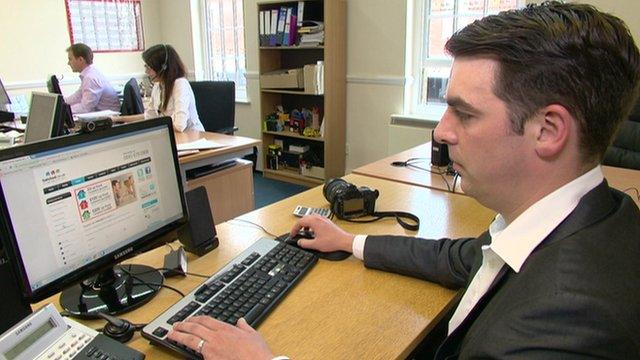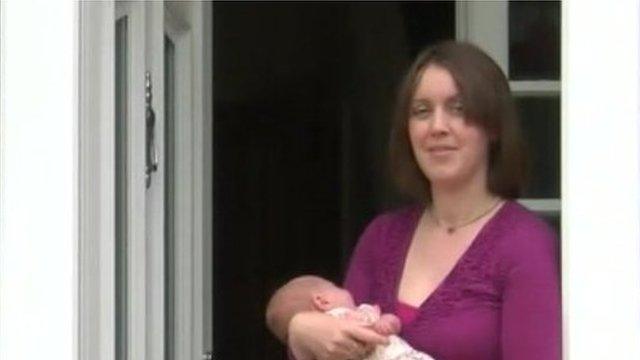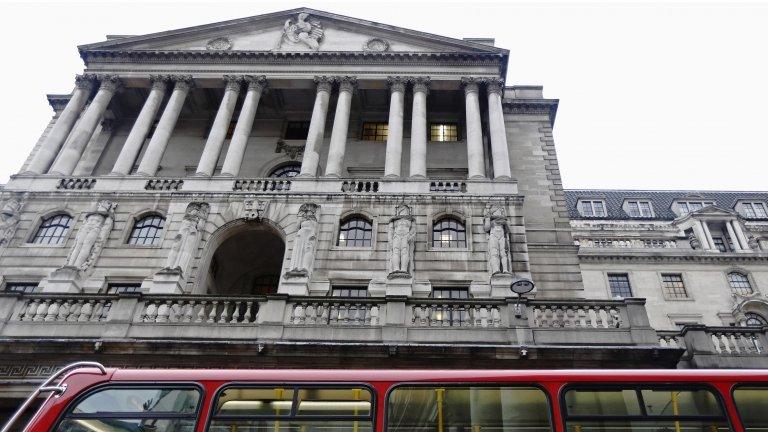Bank loans to business fall again despite Funding for Lending
- Published
Adam Day, managing director at Hatched: "We feel like our hands are tied"
UK bank lending has continued to fall, despite government attempts to reverse the trend through its Funding for Lending Scheme (FLS).
Bank of England data, external showed that net lending fell £300m in the first quarter of 2013.
Lending to individuals was up, but loans to businesses were down.
The figures are an improvement on the last three months of 2012, when bank lending fell by £2.4bn.
The Bank also said that banks taking part in FLS would make more loans available later this year.
FLS was launched last August, in an attempt to boost lending and get the economy expanding.
Under the scheme, banks and building societies are allowed to borrow money cheaply from the Bank of England, providing they loan that money to individuals or businesses.
FLS was recently extended by a year, until January 2015.
Pick up
The Bank of England said that banks had borrowed an additional £2.6bn under the scheme in the first quarter, taking the total amount that has been made available so far to £16.5bn.
When FLS was launched, the government said it expected that up to £70bn would eventually be made available.
The Bank of England said Monday's figures showed that new lending was coming on stream, as old loans were phased out.
"The picture of flat lending growth overall is broadly as expected at this stage, reflecting reductions in some legacy portfolios being roughly offset in aggregate by expanding new lending," said Paul Fisher the Bank's executive director for markets.
He said he expected new lending to pick up further through the rest of 2013.
Some banks and building societies have increased their loans. Barclays and Nationwide were among the lenders to increase their loan book, while RBS, Santander and Lloyds reduced the amounts they lent.
In a statement issued after the Bank of England's figures were released, RBS said it was "punching above its weight" in business lending.
"RBS has increased lending to the real economy by nearly £1bn in Q1 2013, which includes a £600m increase in our business lending - our strongest performance since the scheme launched," it said.
Lloyds Banking Group said the reduction in its lending was as a result of running down the "non-core" parts of its business.
HSBC has not taken part in FLS to date, preferring to finance loans from its own resources.
'Out in the cold'
The Bank of England said the latest figures reflected the continuing trend of an improvement in lending to individuals, but a decline in lending to businesses.
It said one reason for this was that some lenders had reduced their exposure to commercial property, which makes up a significant proportion of their lending.
It also said that most of the reduction in loans was down to three big lenders (RBS, Lloyds and Santander) who were cutting back as a result of the financial crisis, or in order to qualify for state aid.
First-time buyer Gemma Kitchener, 30, says mortgages are getting cheaper
But the British Chambers of Commerce (BCC), which represents over 100,000 businesses in the UK, expressed disappointment with the figures.
"It is a concern that lending continues to contract despite the Funding for Lending Scheme having been in place for nearly a year," said John Longworth, the BCC's director general.
"The real test for Funding for Lending is whether it is able to get credit flowing to young and fast-growing businesses. Unfortunately many of these growth firms are still being left out in the cold," he said.
One example is an online estate agency, called hatched.co.uk, based at Hitchin in Hertfordshire.
It applied for a bank loan of £60,000 last year, but was eventually given just £20,000.
"For me, the bank funding just isn't filtering through to small businesses like our own," said the company's managing director, Adam Day.
"And it's small businesses like ours which are going to help the economy grow," he said.
The British Bankers Association (BBA) said many businesses do not want to borrow at the moment, often because they prefer to pay off debts first.
"Businesses currently have over £15bn of borrowing available that they are not using and are sitting on cash reserves of nearly £126bn almost 6% more than a year earlier," said Anthony Browne, the BBA's chief executive.
"As today's figures show, there should be no doubt that now is a good time for businesses to go and see their bank if they want to borrow. If you run a business with a good business plan and want funding, our message is apply to your bank," he said.
- Published3 June 2013
- Published29 May 2014

- Published3 June 2013

- Published3 June 2013

- Published24 April 2013

- Published4 March 2013
